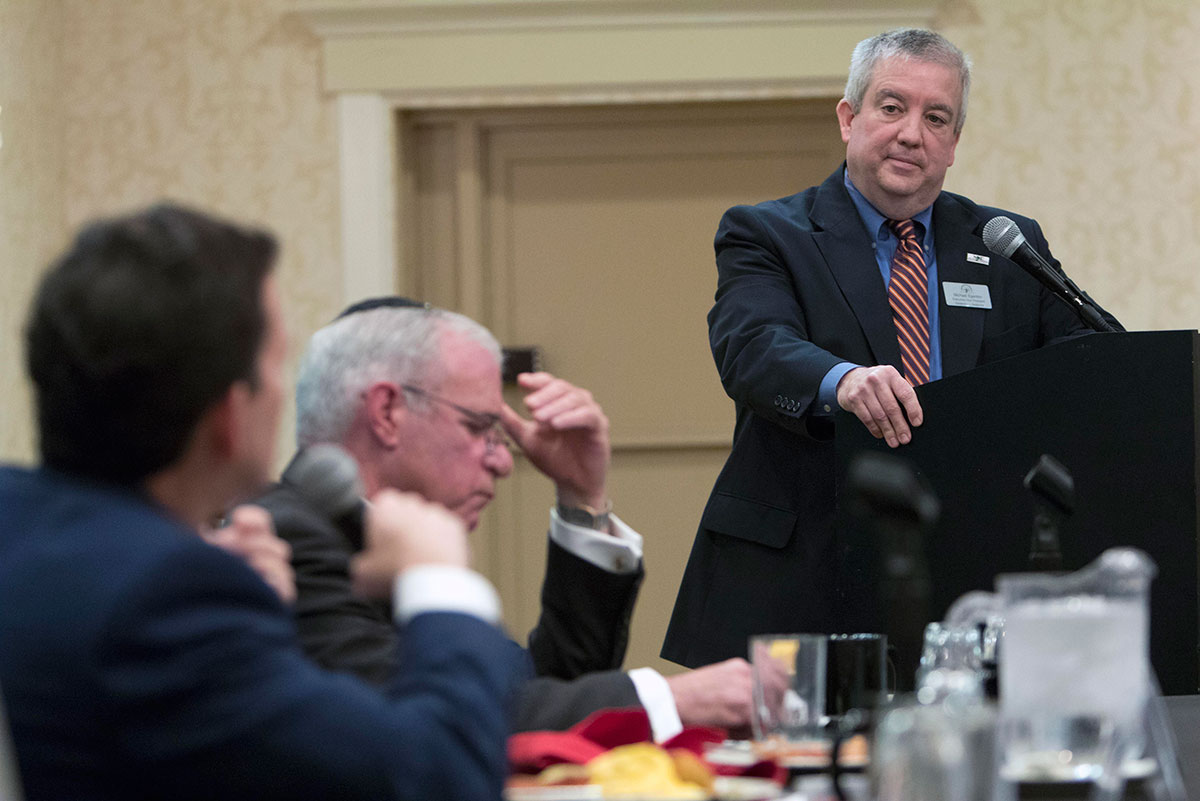Assemblymen Schaer and O'Scanlon Discussed the Issues
State leaders have no shortage of "looming disasters" to solve, ranging from a fund to pay for road, bridge and mass transit maintenance that is on the verge of insolvency to a fund to pay public workers' pensions that is falling further into debt at a pace of $10 million per day, Assemblyman Gary Schaer told N.J. Chamber members. And that doesn't include other issues bouncing around the State House, such as education funding, higher education funding and how to address Atlantic City's budget issues, the assemblyman added.
"The common theme is nothing is getting done," said Schaer, a Democrat, who spoke at a New Jersey Chamber of Commerce Roundtable Breakfast in East Windsor on May 10. "We are talking about solving so many issues in such a short period of time, that it leads to questions about how well it will get done and the mistakes that may be made because we are moving so fast."
Assemblyman Declan O'Scanlon, a Republican, joined Schaer as a speaker at the breakfast and suggested that work is getting done. "There is real progress by leadership going on in the background," O'Scanlon said.
Pension Crisis
O'Scanlon took aim at the public pension crisis, which he characterized as "staggering," since it costs New Jersey $6 billion to $8 billion per year.
"Our pension payments are a moral obligation," said O'Scanlon, but he criticized a Democratic proposal that would constitutionally mandate the state to make quarterly payments into the fund, because it does not identify where the state would get the money. "That (proposal) would dramatically increase our short-term borrowing and would likely hurt our state's credit rating," O'Scanlon said. "There is no answer for revenue."
O'Scanlon added, "Some version of (pension) reform is necessary and it must involve shifting health benefits for (public workers) from 'ultra-platinum' to simply 'gold.' We can't cut (state budget) expenses across the board to solve this problem and we can't tax the wealthy to solve this problem. It will take reform."
Schaer said, "The question is, 'Do we rely on government imposing change or do we rely on negotiations, which is more evolutionary change?' I would side with evolutionary change. We need to talk with each other and not at each other."
The change must come quicker, O'Scanlon responded. "Responsible legislative leaders need to know when the system is broken," he said. "If we don't recognize the problem and take actions, (the state) will go bankrupt. We will be out of money."
State Minimum Wage
The two legislators also had a brief exchange regarding the prospect of the state minimum wage increasing to $15 per hour.
"To increase the minimum wage to $15 would (cause) a real problem," O'Scanlon said. "We would lose jobs. We would actually hurt the people we are trying to help."
Schaer said with the state's next governor likely being a Democrat, New Jersey probably will adopt both a $15 per hour minimum wage and a measure that would require employers to offer paid sick leave. "They are going to happen," Schaer said. "The question is, 'How do you implement them so they are not draconian.'"
A special thank you to Archer & Greiner and South Jersey Industries for sponsoring the breakfast event.
For photos from the event, click on an image below:
{eventgallery event='72157667944560592' attr=images mode=link max_images=20 thumb_width=50 offset=0 }
